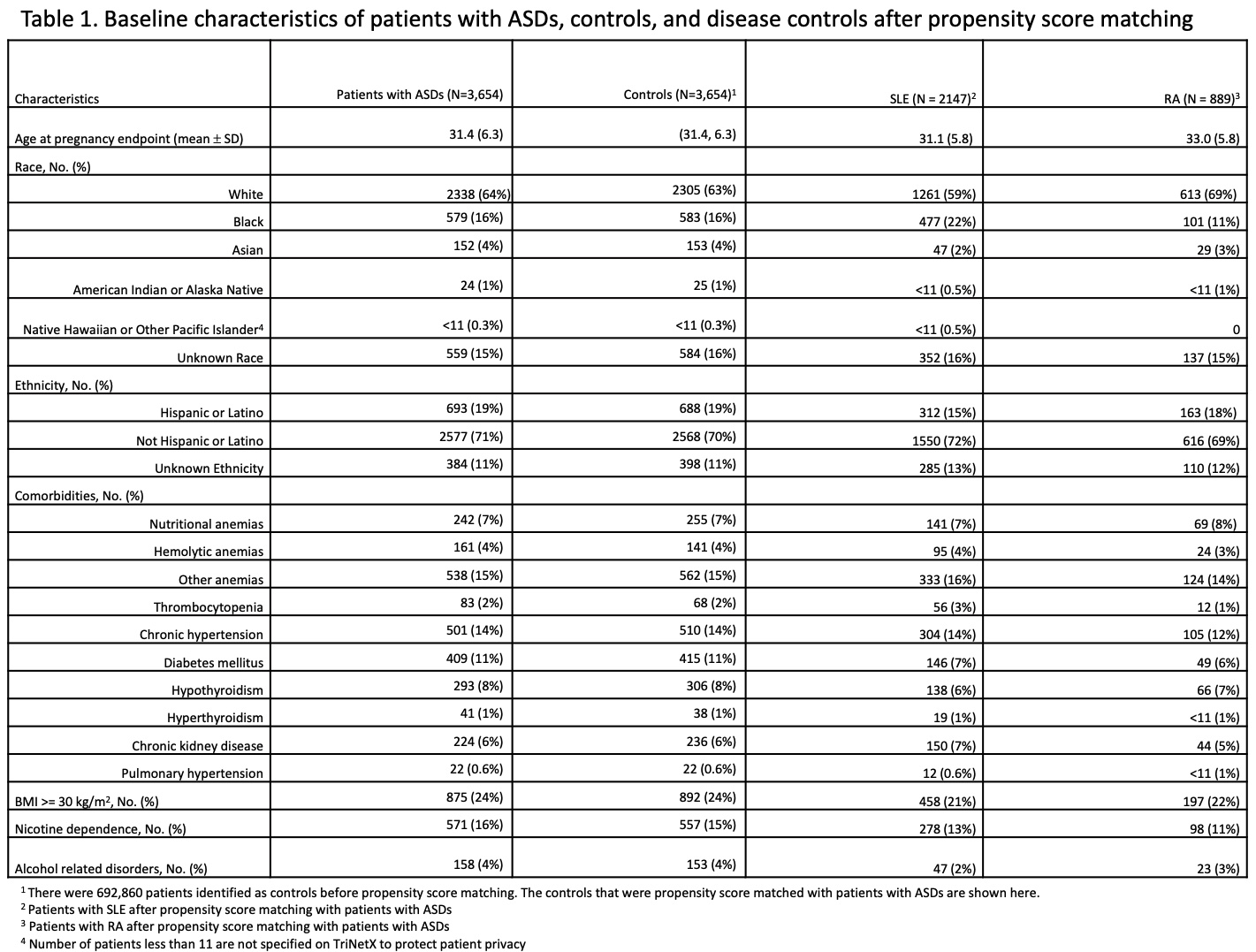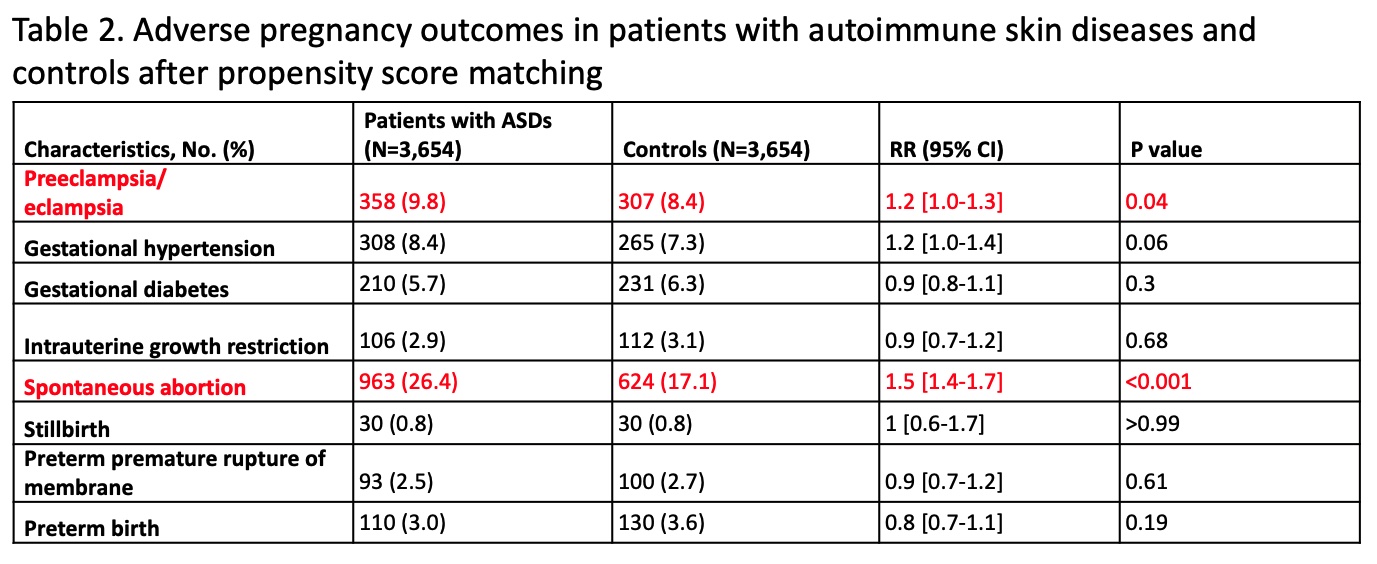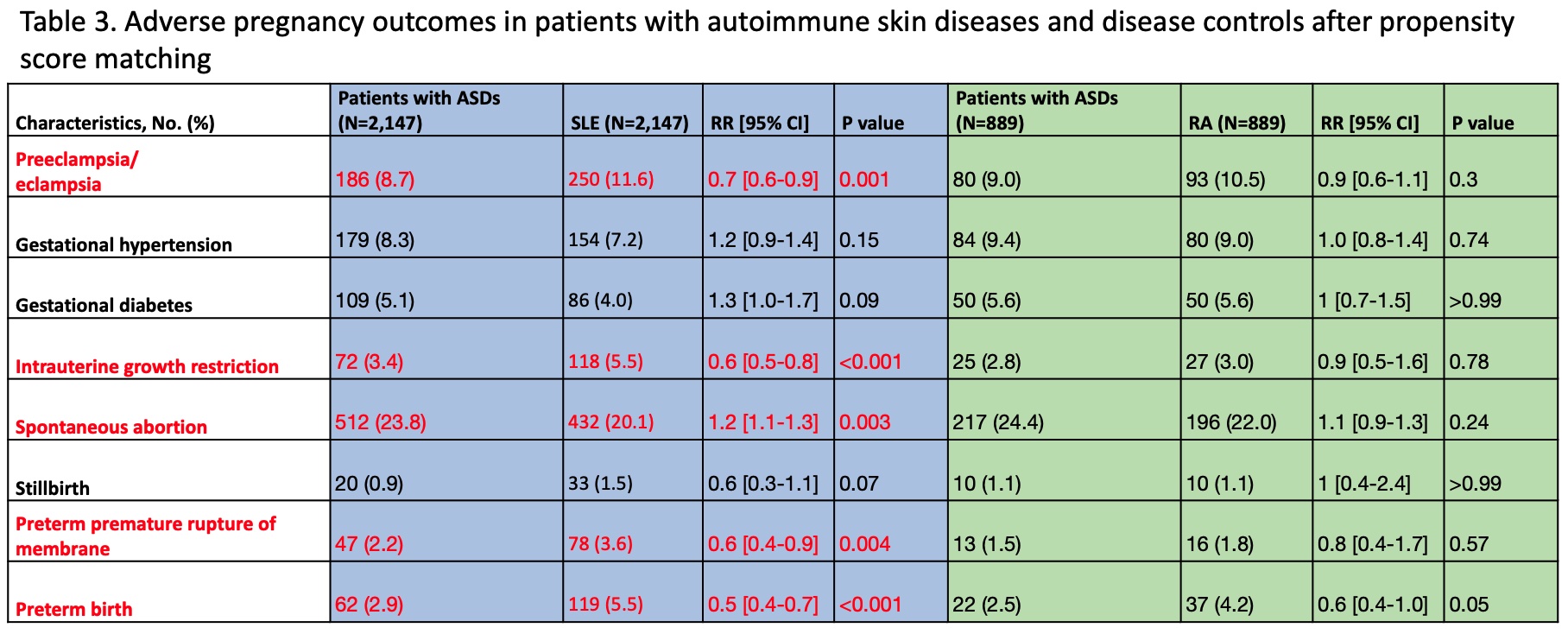Session Information
Date: Sunday, November 12, 2023
Title: (0460–0479) Reproductive Issues in Rheumatic Disorders Poster I
Session Type: Poster Session A
Session Time: 9:00AM-11:00AM
Background/Purpose: Increased rates of adverse pregnancy outcomes (APOs) have been reported in association with rheumatologic diseases such as systemic lupus erythematosus (SLE), dermatomyositis (DM), and rheumatoid arthritis (RA). However, little is known about pregnancy outcomes in patients with autoimmune skin diseases (ASDs). We aimed to determine the frequency of APOs in patients with ASDs. We hypothesized that similar to rheumatic diseases, patients with ASDs would have a higher frequency of APOs than the general population.
Methods: This case-control study was conducted using the TriNetX US Collaborative Network, a database of electronic medical records of 94 million patients in the United States. Pregnant patients aged 15-44 years between January 1, 2016 and December 31, 2021 were included. Pregnancies were identified using International Classification of Diseases, Tenth Revision, Clinical Modification (ICD-10-CM) indicating pregnancy endpoints. Cases consisted of patients with at least one ASD diagnosed prior to the end of pregnancy. The ASDs identified were alopecia areata, bullous pemphigoid, cicatricial pemphigoid, dermatitis herpetiformis, cutaneous lupus erythematosus, epidermolysis bullosa acquisita, morphea, pemphigus foliaceus, pemphigus vulgaris, vitiligo, and amyopathic DM. There were 2 control groups: 1) healthy controls without ASDs, SLE, or RA and 2) disease controls defined as patients with SLE or RA. For all cases and controls, patients with hidradenitis suppurativa or other common autoimmune diseases such as Hashimoto’s thyroiditis and Type 1 diabetes were excluded. The primary outcomes were APOs defined as spontaneous abortion, gestational hypertension, preeclampsia/eclampsia, gestational diabetes, intrauterine growth restriction (IUGR), preterm premature rupture of membranes (PPROM), and preterm birth. Patients with ASDs and controls were 1:1 propensity score matched by age, race, ethnicity, comorbidities, obesity, and substance use. For each outcome, risk ratio (RR) with a 95% confidence interval (CI) was calculated.
Results: 3,654 patients with ASDs were matched to 3,654 healthy controls (Table 1). Patients with ASDs were more likely to have spontaneous abortions (RR=1.5 [1.4-1.7], P< 0.001), and preeclampsia/eclampsia (RR=1.2 [1.0-1.3], P=0.04) than healthy controls (Table 2). When compared to women with SLE, women with ASDs were less likely to have preeclampsia/eclampsia (RR=0.7 [0.6-0.9, p=0.001), have a preterm birth (RR= 0.5 [0.4-0.7], P< 0.001), PPROM (RR=0.6 [0.4-0.9], P=0.004), or an infant with IUGR (RR=0.6 [0.5-0.8], P< 0.001), and more likely to have a spontaneous abortion (RR=1.2 [1.1-1.3], P=0.003). Patients with ASDs had similar risks for APOs as patients with RA (Table 3).
Conclusion: These results suggest that patients with ASDs have increased rates of adverse pregnancy outcomes compared to healthy controls and are similar in risk to RA. In contrast, those with SLE have a greater frequency of APOs indicating that all these groups may benefit from multidisciplinary care with maternal-fetal medicine specialists. Further studies will be helpful to identify mechanisms behind increased risk of adverse pregnancy outcomes in patients with ASDs.
To cite this abstract in AMA style:
Keum H, Bermas B, Patel S, Chong B, Jacobe H. Patients with Autoimmune Skin Diseases Are at Increased Risk of Adverse Pregnancy Outcomes [abstract]. Arthritis Rheumatol. 2023; 75 (suppl 9). https://acrabstracts.org/abstract/patients-with-autoimmune-skin-diseases-are-at-increased-risk-of-adverse-pregnancy-outcomes/. Accessed .« Back to ACR Convergence 2023
ACR Meeting Abstracts - https://acrabstracts.org/abstract/patients-with-autoimmune-skin-diseases-are-at-increased-risk-of-adverse-pregnancy-outcomes/



